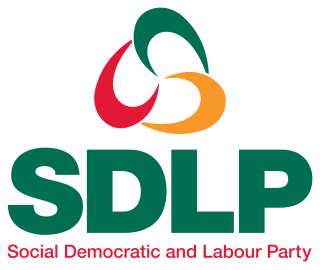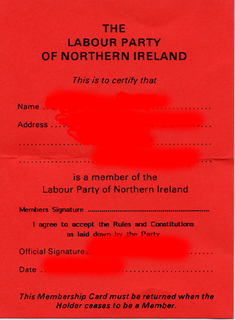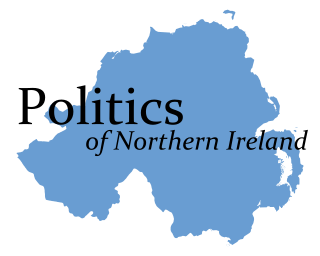Related Research Articles

The Social Democratic and Labour Party (SDLP) is a social-democratic and Irish nationalist political party in Northern Ireland. The SDLP currently has 12 members in the Northern Ireland Assembly (MLAs) and two Members of Parliament (MPs) in the House of Commons of the United Kingdom.

The Good Friday Agreement referendum, 1998 was a referendum held in Northern Ireland over whether there was support for the Good Friday Agreement. The result was a majority (71.1%) in favour. A simultaneous referendum held in the Republic of Ireland produced an even larger majority (94.4%) in favour.
The Northern Ireland peace process includes the events leading up to the 1994 Provisional Irish Republican Army (IRA) ceasefire, the end of most of the violence of the Troubles, the Good Friday Agreement of 1998, and subsequent political developments.

Kieran McCarthy is a retired Alliance Party of Northern Ireland (APNI) politician. From 1998 to 2016 he was a member of the Northern Ireland Assembly for Strangford. He served as Assembly chief whip for APNI in the Assembly.
The National Democratic Party (NDP) was an Irish nationalist political party in Northern Ireland.
The Ulster Independence Movement was an Ulster nationalist political party founded on 17 November 1988. The group emerged from the Ulster Clubs, after a series of 15 public meetings across Northern Ireland. Led by Hugh Ross, a Presbyterian minister from Dungannon, County Tyrone, the UIC sought to end what it saw as the tyranny of rule from London and instead set up an independent Northern Ireland.

The Labour Party of Northern Ireland (LPNI) was the name of two distinct political parties in Northern Ireland, the first formed in 1985 by a group around Paddy Devlin, a former Social Democratic and Labour Party councillor and Northern Ireland Assembly member, and Billy Blease, a member of the British House of Lords, and the second formed by Malachi Curran in 1998.

The Northern Ireland Forum for Political Dialogue was a body set up in 1996 as part of a process of negotiations that eventually led to the Good Friday Agreement in 1998.
The Labour Coalition was an electoral coalition in Northern Ireland of socialist and labour groups, formed to stand in the 1996 Northern Ireland Forum elections. It was listed in the enabling legislation simply as "Labour".

Jim Rodgers OBE is a politician from Northern Ireland who was previously the High Sheriff of Belfast, the judicial representative of the sovereign in Belfast. He is an elected Ulster Unionist Party Councillor and appointed Alderman at Belfast City Council.
The New Ireland Forum was a forum in 1983–1984 at which Irish nationalist political parties discussed potential political developments that might alleviate the Troubles in Northern Ireland. The Forum was established by Garret FitzGerald, then Taoiseach, under the influence of John Hume, for "consultations on the manner in which lasting peace and stability can be achieved in a new Ireland through the democratic process". The Forum was initially dismissed, by Unionists, Sinn Féin, and others, as a nationalist talking-shop. The Forum's report, published on 2 May 1984, listed three possible alternative structures: a unitary state, a federal/confederal state, and joint British/Irish authority. The British Prime Minister, Margaret Thatcher, dismissed the three alternatives one by one at a press conference, each time saying, "that is out", in a response that became known as the "out, out, out" speech. However, Garret Fitzgerald, who described the Forum's report as "an agenda not a blueprint", valued it as establishing a nationalist consensus from which the 1985 Anglo-Irish Agreement could be framed.

The Right Hon. David Wylie Bleakley CBE was a politician and peace campaigner in Northern Ireland.

This is a list of members of the Northern Ireland Forum. The Forum was elected in 1996. Most members were elected on a constituency basis, but the ten highest political parties winning the most votes were each allocated two top-up seats.
Sean Nial Farren is an Irish politician and academic in Northern Ireland.
Hugh Casey MBE was a politician in Northern Ireland.
Seamus Lynch is a former Irish republican and socialist politician.
Jonathan Stephenson was an Irish nationalist politician.

Peter Hadden was a leading member of the Socialist Party in Northern Ireland.
The Forum for Peace and Reconciliation was a forum established by the government of Ireland in October 1994 as part of the Northern Ireland peace process.